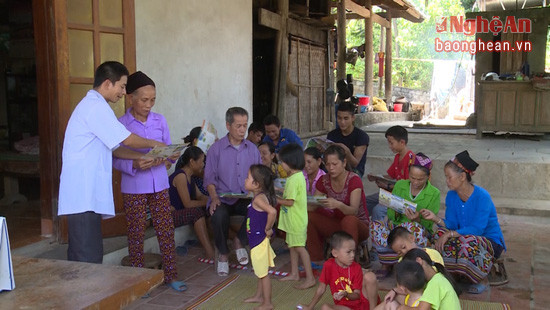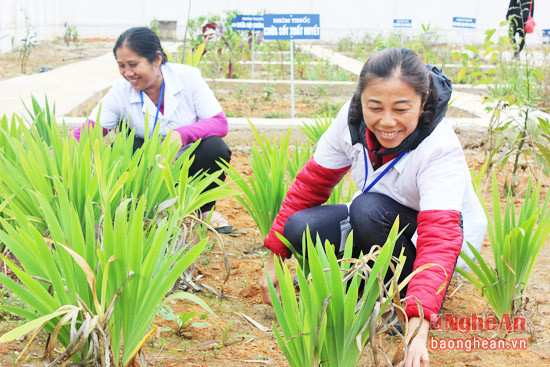Village health care: High pressure, low benefits
(Baonghean) - The level of support remuneration is not commensurate; most of them are old, and have not received basic training... are shortcomings that affect the quality of activities of the village health staff, even though they play a quite important role in taking care of the health of people in remote areas.
Extended arm
For the past 20 years, the footsteps of Ms. Le Thi Minh, a village health worker, have left their mark on the streams, creeks, and hills of Na Tong village, Tam Thai commune, Tuong Duong district. Every day, Ms. Minh travels to each household to promote the benefits of the expanded immunization program, the child nutrition program, and encourage pregnant women to give birth at the commune health station...
In Na Tong, Ms. Vi Thi A Ly is currently 6 months pregnant with her second child. Her husband works far away and there is no one close to take care of her. Ms. Minh has fully supported and advised Ms. Ly to have a healthy pregnancy. Ms. Ly shared: “I myself as well as the people here know the important meaning of expanded vaccination, regular pregnancy check-ups, how to take care of the fetus... thanks to Ms. Minh's enthusiastic and detailed advice. Every month when there is a vaccination schedule, she comes to the house to remind us to go to the commune health station to get vaccinated and checked.”
 |
| Village health workers in Tam Dinh commune (Tuong Duong) distribute health communication leaflets. |
Na Tong village currently has 134 households with 520 people including 3 ethnic groups: Kinh, Thai and Tay Poong. Thanks to her understanding of the customs, habits and lifestyle of the people, Ms. Minh has done a good job of propaganda and mobilization to raise awareness among people in caring for and protecting the health of themselves, their families and the community. Her enthusiasm and responsibility have contributed to bringing practical results. For many years, the village has not had any epidemics. In addition, the village has done a good job of promoting family planning, so for 10 consecutive years, no one in the village has had a third or more child.
Tuong Duong district has many dedicated village health workers like Ms. Le Thi Minh. Mr. Kha Van Dien - a health worker of Quang Thinh village, Tam Dinh commune has also received many compliments from the villagers. Mr. Vi Vo Tuan - Head of Quang Thinh village commented: "The village has difficult roads, the people's education is not uniform, making it very difficult for the health workers to work. But Mr. Dien is very persistent, he strongly propagates in every village meeting, so the villagers change their thinking and actions to reduce births and gradually improve environmental sanitation."
Mr. Luong Van Bang - Head of Thong Thu Commune Health Station, Que Phong District said: Amidst all those difficulties, thanks to the village health force being the "extended arm" of the health station reaching 1,055 households, we have been able to carry out quality work in preventing and fighting epidemics of diarrhea, pink eye, athlete's foot, malaria, flu, and other social diseases.
High pressure, low allowance
Ms. Lang Thi Soa, a medical worker in Dinh Tien village, Chau Hanh commune, Quy Chau district, shared the difficulties and pressures of her job: “Regardless of rain or shine, in addition to the regular assigned work, whenever people need me, I am there immediately. However, many times my husband and children do not understand or sympathize, making it difficult for me to complete my tasks. Moreover, in addition to the difficult roads, there is a lack of working equipment...”
In reality, the dedication and time spent on the work of village health workers are not small, but their income is still low. Currently, Nghe An province is paying allowances of 0.35 and 0.55 of the basic salary coefficient as prescribed by each region. Specifically, for health workers in the plains and lowland areas, they receive 402,500 VND/month, and in particularly difficult areas, they are paid 632,500 VND/month, including 3% health insurance.
Low allowances are not enough to cover living expenses, so in recent years, some village health workers are no longer interested in their work. Many have had to give up this meaningful job to switch to other jobs or quit altogether to focus on taking care of their family's finances - said Dr. Kha Thi Khan - Head of Tam Thai Commune Health Station (Tuong Duong).
 |
| Taking care of the medicinal herb garden at Muong Noc commune health station. |
Ms. Le Thi Minh, a medical worker in Na Tong village, Tam Thai commune, hopes: “We have to take on a lot of work, but the allowance is too small to cover the family's living expenses, many people have had to quit their jobs. A month like me, in area 135, I receive 630,000 VND, but it is almost not enough for gas to travel to meetings and communication sessions. I hope my superiors will create conditions to support us more so that we can work with peace of mind.”
In reality, whether the grassroots health care is strong or not depends largely on the medical staff, doctors working at the health stations and village health workers. The allowance regime is not commensurate, so many students and graduates of intermediate and college medical schools do not have jobs and are not interested in village health work. Among the 5,746 health workers/5,979 villages that the Nghe An Health Department is managing, the elderly account for a large proportion, with more than 10.18%, who do not ensure professional qualifications according to the training program framework of the Ministry of Health, and are not regularly updated with professional knowledge, so there are many limitations in their work.
Doctor Tran Van Cong - Deputy Director of Tuong Duong District Health Center suggested: Basically, the team of village health workers has been trained through 3-month, 6-month, 12-month courses and especially in some cases through intermediate training; recently, there have been investment projects in the District Health Center that have also coordinated with the Department of Health and the Provincial Center for Preventive Medicine to arrange classes to improve professional capacity but the results are not high. We have also proposed that superiors continue to create conditions to improve capacity and retrain the expertise of the staff at the grassroots health level.
| Doctor Nguyen Xuan Hong - Deputy Director of Nghe An Department of Health said: The Department has advised the Provincial People's Committee to issue Decision No. 02 on the number, conditions, standards, selection process, management unit and allowance payment for medical staff in hamlets and villages in the province. Up to now, the medical centers in the province have been seriously implementing this decision, to ensure that 100% of hamlets and villages have effective medical staff. Regarding the inappropriate allowance level for medical staff in hamlets and villages, the Department of Health proposed that the Provincial People's Council and Provincial People's Committee consider increasing the allowance level for medical staff in hamlets and villages, especially in remote and disadvantaged areas. |
Thanh Son - Charter
| RELATED NEWS |
|---|

